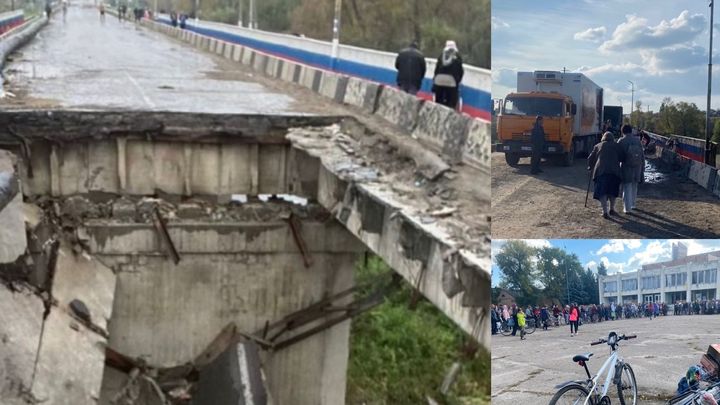
Feet on the Ground in Ukraine
Donation protected
Dear friends,
Some of you will know that my husband, Ben, has been in Ukraine for the last two months. He has been volunteering his time, resources and experience as a former British officer, trying to help in any way he can. Most recently, he has been based out of Kharkiv, assisting humanitarian NGOs and unaffiliated individuals from all walks of life and all over the world. Working within the recently-liberated territories, he has witnessed conditions that most of us could never fathom.
The main focus of operations at the moment is two-fold: get aid in, and get people out. Although Russian Forces no longer occupy the liberated towns and villages, they are still under artillery barrage almost daily. They lack vital supplies and utilities such as drinking water, food, electricity, gas, and cell coverage. Civilians, from infants to the elderly, are forced to shelter in what remains of their homes.
Every day, motley crews, of anyone willing and able, drive into the liberated territories with vans full of water, food, medicine, clothing, and hygiene products (to give a limited list) to attempt to sustain these victims of war for even a few days. They will also evacuate anyone who wishes to leave and head to the relative safety of the cities. Specialized evacuation operations are also planned and conducted for the elderly, the infirm, those with mental difficulties, and children.
The aspect that is least understood outside of Ukraine, is that the large international NGOs are not conducting these operations. It is, quite literally, volunteers (local and foreign working together) putting themselves forward to be where the need is greatest. Operations are mostly coordinated by social media groups, and volunteers will drive through the night to get to the point of need. Some volunteers have spent multiple thousands of dollars of their own to keep themselves going. Many of the volunteers Ben has encountered have been able to make life-saving deliveries of aid through sheer force of will and determination, lacking any organizational or financial support network.
The key asset of any humanitarian operation is vehicles to carry aid in and people out. It is the primary limiting factor in what can be achieved in any one day. A warehouse of aid is no use without the people and vehicles to get it where it needs to be. Many volunteers have brought their own vans from their home countries; some have rented in neighboring countries or Kyiv. Every van requires fuel and constant maintenance due to the poor roads. Specialized vehicles such as ambulances will also require items such as stretchers and disposable hygiene coverings.
Secondary to the vehicles is the aid itself. While some fantastic organizations are doing incredible work providing bulk items, the ability to remain responsive to local needs can make an enormous difference. Volunteers speak to local administrators every time they visit a town, who inform them precisely what is required. As individuals, these volunteers are then able to track down and buy these specific items that very day and deliver them at the next opportunity. When there is no specific request, vans will take water, food and warm supplies, which is always needed.
Thirdly, as heartbreaking as it may be to us, those who decide to stay in their homes still have their dignity. The ability to clean and make ourselves presentable is a vital part of our shared humanity. Hygiene products are a human necessity, not a luxury. Moreover, toys, presents, and sweets can make a child’s day amid an experience we hope never to endure.
Three factors make the need more pressing: Successful Ukrainian counter-offensives have made it increasingly challenging to reach liberated territories across blown bridges and destroyed roads; The coming winter in Ukraine will be brutal and civilians will have a desperate need for warm clothing and fuel for heating. This needs to be sourced and delivered now; Unfortunately, Ukraine is slipping down the international news cycle and the amount of aid arriving in country is stalling fast.
Any donation makes a massive and integral difference to these volunteers. I am humbly asking for anything that could make a difference to any number of lives. While communicating with Ben, I have heard the messages of people asking for their families to be brought to safety, and the thank yous when they have been reunited. One tank of fuel can mean twenty civilians returned to their families in safety. No donation is too little. If donating is not an option, sharing this helps tremendously.
Thank you so much for taking the time to read this,
Chelsea Miller.
Spending priorities:
Fuel for currently-operating evacuation and aid delivery vehicles.
Vital vehicle maintenance (e.g. tyre replacements, suspension).
Hire of new vehicles.
Specialized equipment for complex evacuations (e.g. stretchers, wheelchairs).
Specified aid requests from local authorities.
General aid (water, food, blankets) when entering new territories without specific requests.
Hygiene products including feminine care.
Toys, sweets and presents for children.
Some T&Cs:
No donations will be used to fund the volunteers themselves (accommodation / food / drink etc). Every single penny / cent / hryvnia will be used to fund humanitarian logistics and activities.
No donations will be used to fund military logistics or activities.
Although donations will be forwarded to Ben in Ukraine, he will then sub-distribute as required to volunteers on the ground.
No money will be given to other volunteers ‘on credit’, it is for specified uses only.
All in-country spending is accountable and requires receipts.
For those who would rather donate to a registered charity, please consider World Central Kitchen. They are working non-stop to put together family-sized boxes of food, which are then delivered to the liberated territories by convoys of volunteers. Link: https://wck.org
Organizer and beneficiary
Chelsea Miller
Organizer
Los Angeles, CA
Benedict Leonard
Beneficiary